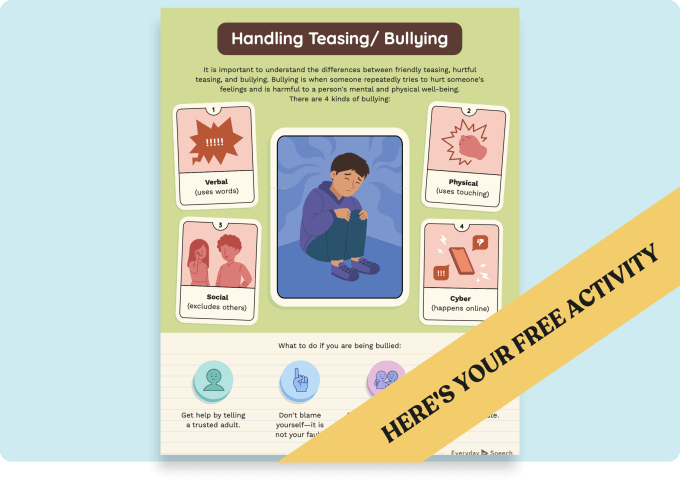Teaching Conversation Skills to Special Education Students: A No-Prep Activity
Get free social skills materials
No-prep lessons on self-regulation, emotional recognition, conversation skills, and more.
Sign up hereIntroduction
Teaching conversation skills to special education students is an essential part of their social-emotional learning. In this blog post, we will discuss an engaging no-prep activity that helps students understand the importance of taking turns and keeping their responses concise during conversations. By practicing these skills, students can develop stronger relationships with their peers and improve their overall communication abilities.
No-Prep Activity
This no-prep activity is called “Movie Talk” and is designed to help students practice taking turns and providing concise responses in conversations. Here’s how it works:
- Divide students into pairs or small groups.
- Choose a topic, such as favorite movies, for the students to discuss. You can also allow students to pick their own topics.
- Ask the students to take turns talking about their favorite movies. Encourage them to provide one to three sentences as a response when it’s their turn.
- Remind students to give others a chance to speak and to listen attentively when it’s not their turn.
- After a few minutes, ask the students to switch partners or groups and repeat the process with a new topic.
This activity not only promotes conversation skills but also encourages active listening and respect for others’ opinions.
Discussion Questions
After completing the “Movie Talk” activity, use these discussion questions to further explore the topic and stimulate conversation among students:
- Why is it important to take turns during a conversation?
- How did it feel when you had to limit your response to one to three sentences? How did this affect the conversation?
- Why is active listening important in a conversation, and how can we practice it?
- How can we show respect for others’ opinions during a conversation, even if we don’t agree with them?
- What are some other conversation topics you would like to discuss with your classmates?
Related Skills
Teaching conversation skills is just one aspect of social-emotional learning for special education students. Other related skills that contribute to their overall development include:
- Empathy: Understanding and sharing others’ feelings and perspectives.
- Conflict resolution: Finding peaceful solutions to disagreements and misunderstandings.
- Self-awareness: Recognizing one’s own emotions, strengths, and weaknesses.
- Self-regulation: Managing emotions and behaviors in different situations.
- Collaboration: Working effectively with others to achieve common goals.
Next Steps
If you enjoyed the “Movie Talk” activity and want to explore more resources to help your special education students develop conversation skills and other aspects of social-emotional learning, sign up for free samples at Everyday Speech. You’ll find a wide range of activities, games, and lesson plans designed specifically for special education students, all aimed at enhancing their social-emotional learning experience.


